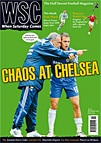 Brazilian Kerlon's cheeky antics rile opponents, reports Robert Shaw
Brazilian Kerlon's cheeky antics rile opponents, reports Robert Shaw
The controversy surrounding the drible da foca (seal dribble) of Cruzeiro’s teenage midfielder Kerlon has the makings of a modern Brazilian footballing fable. The storm centred on an incident in a remarkable match between Cruzeiro and local rivals Atlético MG on September 16. In the 80th minute, with his team leading 4-3, Kerlon’s trademark dribble – juggling the ball with his head while on the run – was brought to a shuddering halt by the intervention of opposition full-back Coelho, who barged violently into the Cruzeiro player. Coelho was sent off and later suspended for 120 days, effectively ending his season. But the episode has provoked a wider debate in Brazil about the boundary between tricks and provocation in football.
Atlético coach Emerson Leão warned the foquinha (little seal): “I am worried that in the future he could be out of the game for many years if he gets a serious kick in the head.” Ironically it was the same Leão who had licensed Robinho’s multiple step-overs with Santos on the way to the 2002 title.
The arguments were inflamed by national coach Dunga, who lunged in to side with the defender: “In my view Coelho committed a technical foul, shoulder-to-shoulder, without malicious intent.” Many winced at the memories of Dunga’s “ball or shins” approach to tackling during his own playing career. Cue outrage from sectors of the sports press still finding it hard to stomach one of Brazilian football’s enforcers as custodian of the national team. Luiz Fernando Gomes of daily football paper Lance! viewed Dunga’s comments as a challenge on the country’s footballing culture: “Brazil, our football, our national team, can’t make space for the Coelhos and Afonsos. We need foquinhas and Patos [see below] – not necessarily these two boys themselves – but players like them, who make their work into an art form.”
Others have argued that the seal manoeuvre is not the most efficient way to move a football from A to B and that Kerlon – who had come on as a substitute – might try to tie down a regular place in the Cruzeiro first team before unveiling his juggling.
In a way, Kerlon’s dribble summed up the philosophy of a Cruzeiro team that, along with Botafogo, have illuminated domestic football in 2007 with a commitment to attack. In second place in the national championship and in what looks to be a forlorn pursuit of efficient but unexciting São Paulo, Cruzeiro have scored 63 goals in 27 games but conceded 36 more than the leaders.
Aside from the celebrated pedaladas (step-overs) of Robinho and Alexandre Pato’s knack for bouncing the ball on his shoulder, other outrageous tricks have prompted a strong reaction from defenders. Botafogo’s cult striker Tulio was diplomatically rested for a Copa Libertadores match with Chile’s Universidad Católica in 1996, after he stopped to backheel a goal in the first leg. The São Paulo championship final of 1999 was reduced to a mass brawl when Paulo Nunes and the rest of his Palmeiras team-mates took umbrage at the stop-and-juggle routine of Corinthians’ Edilson.
Commentators who suggest that Kerlon may be jeopardising a promising career by persisting with this trick could have a point. Brazil is well stocked with people who can do extraordinary things with a ball. The national beach soccer team can perform all kinds of wizardry, but few have played above second division or youth-team football on the turf, while Brazil’s celebrated futsal artist Falcão was unable to make the grade after changing code with São Paulo. In Brazil’s senior team, Denilson and, to a lesser extent, Alex have had fewer chances largely because their extravagant ball skills created inflated expectations.
As legendary left-back Nilton Santos commented as he watched one of the country’s troupe of itinerant football jugglers performing tricks for tourists outside the Maracanã: “Yes, he looks great there clowning around, but put him in a game and you’d see he hasn’t a clue about football.” Kerlon is unlikely to sink without trace, however, with managers such as Sir Alex Ferguson making inquiries, seven years after Manchester United players and staff stood in awe of the kids on Rio’s beaches during the World Club Championship.
And if there is to be a moral from this tale, Kerlon’s own words reflect what is at stake: “People need to know what the basis of Brazilian football is: should it be it futébol-arte or just a game full of violence?”
From WSC 249 November 2007